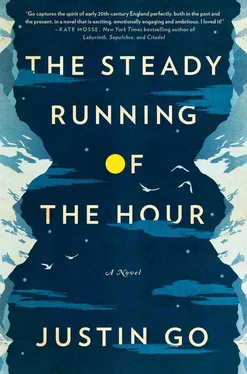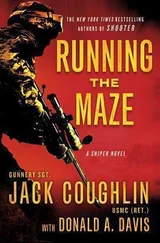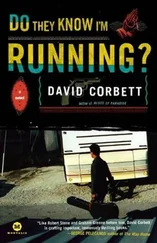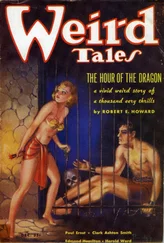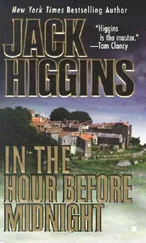The sketches are all captioned, mostly in English. The City Is Sleeping. A drawing of the rooftops of apartment buildings, probably in Paris, layers of chimneys stretching out to the horizon. I feel guilty, but too curious to stop. I turn the page. Young and Fearless. A drawing of what looks like Claire and another girl, seated in high-backed chairs, looking straight at the viewer. Un Américain en France. A sketch of me, sleeping on the train with my jacket rolled up against the window and a book in my lap.
I shut the sketchbook and grab my jacket, following a path that crosses a field behind the house. The trail is damp and spotted with puddles from the rain last night. At the end of the field I meet Mireille coming from the opposite direction. She looks surprised to see me.
— I thought you were reading, I didn’t know you wanted to come—
— I didn’t either.
Mireille smiles. She leads me on a one-lane footpath into the forest and we cross a narrow stream. I ask her what the beech trees are called in French and soon she is telling me the names of oak and sweet chestnut and maple trees, of the white flowers on the ground and the black birds flapping overhead, fleeting silhouettes against an iron sky.
— Ce sont de ardéidés, je crois. Comment dit-on en anglais?
— I don’t know. They looked pretty big. Were they crows?
She laughs and shakes her head. — They weren’t crows.
— Don’t laugh at me. I didn’t grow up near a forest. I never learned the names of these things.
— Well, Mireille says. You’re learning them now.

After that Mireille never leaves the house without inviting me. There is no television here, no computer and no books except those we brought with us. So we talk the rest of the day into the night, in the house and on the trails that wind throughout the forest. Our conversation alternates between French and English. Mireille loves her language and she lends me that appreciation, reminding me of the days when I was infatuated with its thick exotic sounds. We both want to practice the foreign language, but when the words come quickly we revert to our native tongues, especially if we are arguing a point.
We talk about war and Mireille tells me about her grandfather who became a résistant at the age of seventeen, killing Germans when he was only a child himself. We talk about death and Mireille says she isn’t afraid to die, that she is curious to see any world other than this one. But I say she will be scared enough when the time comes.
— You can be scared for both of us, Mireille teases. You worry enough for two people.
— I know. Maybe you should take your share.
We go on talking all through dinner, and though I mean to work on a new research plan, I never do. Mireille uncorks a bottle of wine and pours it into a pair of empty jars. I ask her why she decided to go to art school.
— If I study design, she says, I can get some kind of job later. I’m getting older, I need to find some kind of career—
— I didn’t know you were so practical.
Mireille looks down into her wine. — Of course there’s more than that. To create things that are beautiful, I think it’s important. Even to make something ugly, as long as it’s true. After the last few years — it’s the thing I can still believe in.
— What did you believe in before?
— A mistake. Thinking you could fix anything if you cared enough about it. That may be true for art. But not for people.
She looks up at me.
— Anyway, you know what I’m talking about. You take pictures, it’s the same thing—
I shake my head. — I’m not making anything special. Usually I barely look at my pictures after I print them.
— Then why do it?
— I just like taking pictures. When you carry a camera, it’s a different way of seeing things. You notice more, you have to look for details.
— What about the pictures you took of me and Claire in front of the Seine? Did you take those just to notice more?
— No. I took them because I’m a tourist.
Mireille smiles. — Come on, let’s sit outside.
I pick up the bottle of wine and Mireille gets a couple of wool blankets from the living room. We sit on the back steps. The night is cold but the stars hang bright above the treetops in the yard.
— You know when I first met you, Tristan, I didn’t know what to think. Maybe I still don’t.
Mireille lights a cigarette. I see the silhouette of her face turn away and then back to me.
— On the train here, everything you told me about the northern railway and the Rothschilds. How do you know that?
— I don’t know. I read some books about railroads.
— And in Amiens, Mireille adds, you knew about the Hortillonnages even though you’ve never been there before. Or at the cathedral, all the statues in the doorway and your story about the head of Jean le Baptiste. How did you know all that?
— I took a class on it. Plenty of people know that stuff—
— Not like that. They might tell you one or two things, but most people wouldn’t know enough to talk for hours, because they’re not that interested. Tristan, you don’t look in the mirror before you leave the house, but you spend ten minutes worrying about what to carry in your bag. You keep changing your mind, taking out your jacket and putting it back in. And you’re so strange about money. You’d rather walk an hour than pay two euros for the bus, but when I ask you about this inheritance, you don’t want to talk about the money.
— It just makes me feel weird.
— I believe you. But anyone but you, it’d be the only thing they’d think about. I know it must be hard for you, all this pressure, and I want to help. But I don’t really know you. I don’t know anything about your real life—
— Then ask.
Mireille taps her cigarette against the steps. She looks at me.
— What happened to your mother?
— She died three years ago.
— From what?
— Colon cancer.
There is a long pause. Then Mireille says, — I’m sorry.
We sit in silence. Mireille pours more wine into the jars.
— Is that why the money bothers you? Because it comes through your mother?
— Maybe.
I take a sip of wine, flipping up the collar of my jacket.
— The way she lived, it wouldn’t have made much difference to her. But I think part of me really wants it.
— That’s normal. Why should it bother you?
— It’s just money. There are better things to care about. What else do you want to know?
Mireille hesitates. — Do you have a girlfriend in California?
— No.
She takes a drag from her cigarette. A car passes on the road and she turns to follow its headlights.
— How did you know those letters would be in Sweden?
— Dumb luck. I was looking for something else, but I found them instead.
— You don’t think it’s strange?
— Of course I think it’s strange.
Mireille nods, drinking the last of her wine. I rub my hands together under my blanket.
— It’s freezing out here.
— We can go inside.
We stand up, gathering the jars and the empty bottle. Mireille turns back to me.
— One more question. Do you really believe in all this? The lawyers, the money, the English couple?
— You’ve asked me that before.
— Do you believe in it or not?
— I do.
Mireille pulls the door open for me, the yellow light pouring out from the living room.
— I just wanted to be sure.

We are setting the table for breakfast. Mireille puts down two cups of coffee and begins to butter a long tartine of baguette. I stir milk into my coffee, shaking my head.
Читать дальше
